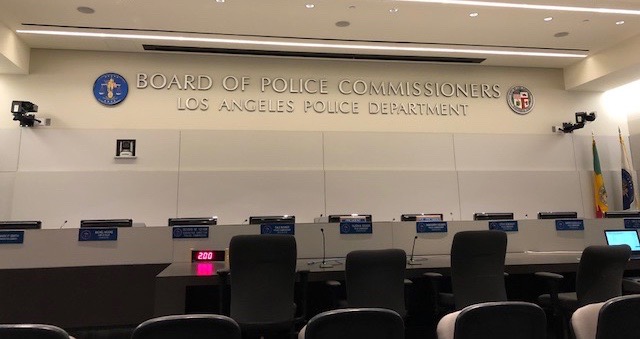
On Jan. 21, Los Angeles Police Department staff presented the findings of an internal audit on the department’s response to reported child abuse to the Police Commission. Photo: Daniel Heimpel
This week, the Los Angeles Police Department (LAPD) released a much-anticipated report focused on its response to the nearly 4,000 allegations of serious child abuse it had marked “no investigation” from January 2018 through June 2019.
The report found that “the department appropriately handled” 99.7 percent of the cases, and that many of the cases noted as no investigation were clerical errors, duplicates or had been investigated by other agencies. But it also confirmed that Los Angeles Police routinely chose not to investigate “emotional child abuse” allegations that are often investigated by other major law enforcement agencies in L.A. County.
In October, a Chronicle of Social Change investigation found a wide disparity in how often law enforcement agencies across L.A. County investigate child abuse allegations transmitted through the county’s electronic suspected child abuse reporting system (ESCARS).
From January 2018 through June of 2019, LAPD received 36,000 allegations of serious child abuse and reported that it had “not investigated” a little more than 10 percent of those reports, according to data obtained from the District Attorney’s office. The Los Angeles Sheriff’s Department fielded nearly 26,000 reports during that time, with Long Beach Police receiving nearly 4,150. The Sheriff’s Department reported it had “not investigated” 3 percent of the reports it received during the time frame in question, while Long Beach cops reported investigating every child abuse report transmitted to them through ESCARS.
ESCARS is run by the L.A. County District Attorney’s Office and cross-reports cases of child abuse among the Department of Children and Family Services (DCFS) and the county’s 47 law enforcement agencies. DCFS policy dictates that all “allegations of sexual abuse, physical abuse, severe neglect, emotional abuse and exploitation,” must be transmitted to law enforcement.
According to the LAPD report released this week, 1,670, or 42 percent of the 4,000 cases marked as “not investigated” in 2018 and the first half of 2019, involved “emotional abuse, general neglect or a non-criminal alert of potential future abuse.” Per a 2015 agreement between DCFS and other L.A. County law enforcement agencies, LAPD did not investigate those cases, and instead referred them back to DCFS, according to the report and police officials.
DCFS did not immediately respond to requests as to whether or not those investigations were indeed carried out.
The California penal code describes emotional child abuse as manifesting “in states of being or behavior, including, but not limited to, severe anxiety, depression, withdrawal or untoward aggressive behavior toward self or others.”
A number of studies have shown that emotional child abuse can cause as much lasting damage as physical or sexual abuse.
Requests to LAPD as to the number of emotional abuse cases among the 42 percent were not answered at publication time.
While the 2015 agreement guiding local law enforcement’s responsibilities in investigating child abuse points out that “reporting of emotional child abuse” is “discretionary,” it states that signatories, including LAPD, “should evaluate and encourage an investigation of an allegation of suspected emotional child abuse given the potentially grave consequences that can occur when a child feels isolated and/or without support.”
Commander Carlos Marquez oversees the Sheriff’s Department’s Special Victims Unit, which is responsible for criminal child abuse investigations. Marquez says that his agency’s policy is to conduct an investigation on virtually every report of suspected child abuse transmitted through ESCARS – including emotional abuse.
“A lot of times if you really understand child abuse, you understand that emotional abuse is only one aspect,” Marquez said. “There are usually other issues in the home: domestic violence, sexual abuse. Very rarely have I seen where emotional abuse is just emotional abuse without something else in the home.
“My thing for our department is that we roll on all of them to do everything we can for the safety of the children.”
In addition to the LAPD child abuse reports marked “not investigated” involving emotional abuse, another 42 percent were “duplicates.”
Other reports marked as “not investigated” included those handled by other law enforcement agencies, incidents that occurred outside of the state or country, administrative errors by DCFS, or matters involving Los Angeles Unified School District staff and handled by the district. Twenty-five were wrongly marked “not investigated” after being transferred to the department’s Human Trafficking Unit for investigations that “involved minors forced into prostitution, and generally resulted in a crime report for kidnapping, rape, or another form of child abuse.”
An additional 304 did result in an investigation, but were wrongly labeled by LAPD staff in ESCARS.
Ten of the reports indicated “a possible crime and no report was taken,” prompting “immediate and appropriate action” outlined in the LAPD report.
The report includes a number of recommendations including routinely auditing cases closed as “no investigation” and increased training.
At the Los Angeles Police Commission where the reported was presented Tuesday, Commission President Eileen Decker voiced her concern about whether or not audits would forestall missed investigations.
“I am not sure I am satisfied with random audits,” ” Decker said. “[I am] not sure that is sufficient; that we don’t lose children in this system.”
At a commission meeting last week, Police Chief Michel Moore laid out other changes to how LAPD will respond to reports of child abuse, including a new policy mandating that suspected child abuse reports are reviewed in 10 days as opposed to the old standard of 30.
“These are suspected child abuse reports and deserve a quicker and faster resolution as to when they merit a law enforcement investigation,” Moore said at the January 14 Police Commission meeting.
Moore also said the newfound scrutiny of child abuse was an “opportunity” to have DCFS staff collocate in the two LAPD offices that field the highest volume of suspected child abuse reports.





